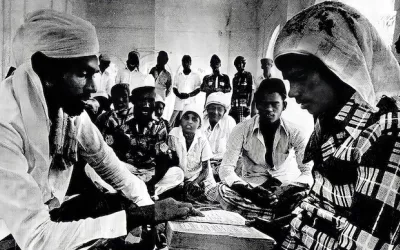The Battle of Bassorah, Battle of the Camel, or Battle of Jamal was a battle that took place at Basra, Iraq in 655 C.E. between forces allied to Ali {cousin and son-in-law of Prophet Muhammad and the fourth caliph} and the superior forces of rebel Arabs allied to Aisha who opposed Ali's status as Caliph on the grounds that he had not tried to find out who was responsible for his predecessor's murder. This was the first major civil war in Islam. This was the first incident Muslims shed blood of the Muslim’s. After death of umar (the second caliph) a tiny group of disciples chose Uthman passing over Ali who was the direct heir of Prophet Muhammad. In 656 armed men from Egypt who were unhappy with his Caliphate arrived in Madina. They stoned Uthman in the mosque and knocked him unconscious and then besieged him in his own house. And finally they broke in and stabbed him to death. His own treasured copy of Koran was soaked with his blood. Though it had previously been a contested matter, Ali ibn Abi Talib was offered the caliphate by the majority of Muslims after Uthman's death. He is reported to have refused the caliphate, saying, "You are not a people fit for my rulership nor am I a master fit for you people." However, he later accepted the caliphate.
These events displeased Aisha, the third wife of Muhammad. She evidently believed that Ali was wrong to occupy himself in other tasks before finding Uthman's murderer. She challenged Ali's caliphate under the claim that Ali had been unsuccessful in finding Uthman's murderer, calling for revenge, Qisas (an eye to eye) for Uthman. After Ali had been chosen as the fourth Caliph, Aisha instigated a rebellion against his rule. Aisha gathered support from previous contenders for caliphate Talha and Zubayr. Aisha also managed to enlist the support of the powerful clan of Banu Umayyah, to whom Uthman had belonged. The ex-governors of Uthman who had been replaced by Ali also joined her. Yala, the ex-governor of Yemen, had carried off a large sum of treasure to Mecca when he was deposed. He gave it over to Aisha. Aisha was mounted on a litter on the camel and marched from Mecca at the head of 1,000 men. On her right was Talha and on her left, Zubayr. On their way many more joined them, and their numbers swelled to 3,000. A month after the death of Uthman, questions began to arise whether Talha or Zubayr would, in the event of a victory, become Caliph. Ali admitted this and, alarmed, gave orders that the column destined for Syria should march instead to Nejd, hoping thereby to intercept the insurgents on their way to Basra. A column of 900 men got together, at the head of which Ali marched hastily in pursuit of the insurgents. On striking the Mecca road he found that they had already passed. Not being equipped for further advance, he halted there. Messengers were sent to Kufa, Egypt and elsewhere, demanding reinforcements, for which the Caliph waited before he went forward.
Ayesha’s army reached Basra and encamped close by. Messages were exchanged, and Uthman Ibn Hanif, the governor of Basra, aware that the cry of vengeance on the regicides really covered designs against Ali, called an assembly to gauge the temperament of the people. Finding from the uproar that the strangers had a strong party in the city, he put on his armor, and, followed by the larger portion of the citizens, went forth to meet the enemy. A parley (तहाची बोलणी)ensued. Talha, Zubayr, and Aisha all declaimed against the murderers of Uthman and demanded justice for his murder. The other side were equally loud in their protestations against Aisha and her attack upon their city. They said it was a shame and a slight(अनादर) on the memory of Muhammad for her to forego the proprieties of her position as a "Mother of the Faithful." They argued that Ali had been elected and saluted Caliph; and now Talha and Zubayr were disloyally violating the allegiance which they had been the first to swear. When the envoy returned from Medina and made his report, the insurgents called on Uthman Ibn Hanif to evacuate the city according. He produced the Caliph's letter and refused to do so, but the insurgents had already obtained a firm footing in the city. Arming themselves, they repaired to the congregational Mosque for evening prayers, and, under cover of night, were not discovered until they had overpowered the governor's guards. They entered the adjoining palace and made a prisoner of the governor, Uthman Ibn Hanif. On the following day, a severe conflict raged throughout the city, which ended in the discomfiture(defeat,दाणादाण) of Ali's party. Thus the government passed into the hands of Talha and Zubayr.
They took 70 of the governor's officers who were in charge of the public treasury as prisoners, and brought them to Aisha who ordered that they be put to death. The life of Uthman Ibn Hanif, the governor, was spared. Set free, his head and beard were shaven, and his eyelashes and moustaches clipped; in this shamed state the ousted governor made the best of his way back to Ali. Talha and Zubayr then made the proclamation that every citizen who had engaged in the attack on Uthman, the Caliph, should be brought forth and executed. The order was carried out, and great numbers of men were put to death. It is reported there were 400 men killed in this way. The insurgents communicated tidings of their success to allies in Syria, where the Umayyad governor Muawiyah I ruled. Aisha also sent letters to Kufa, Medina, and Yemen, in an attempt to dissuade people from their allegiance to Ali, and stirring them up in the name of avenging the death of Uthman. Soon 10,000 men, some by land, some by river, set out to join the Caliph, who, advancing slowly, awaited their arrival. Thus reinforced, Ali was able at last to take the field effectively, and march on the rebellious city. Basra itself was not wholly hostile, and scores of the citizens came out to join the camp of Ali. The insurgent army, which still nearly equalled that of the Caliph, now marched forth with Talha and Zubayr ibn al-Awwam at their head, and Aisha herself seated in a well-fenced litter of her camel al-Askar. The army of Basra, numbering some 20,000 men, remained encamped on the outskirts of the city. Ali's force, advancing unopposed, halted within sight of the city. Negotiations for peace resumed, evidently substantial and sincere. Ali himself approached on horseback and Talha with Zubayr rode out to confer with him.
Towards morning, a sudden shock changed the scene. The besiegers of Uthman, during the night, carried their secret design into execution. Led by them, squadrons of Badawi lances bore down upon the Basra tents. This created no small measure of confusion. Each camp believed that it had been attacked by the other; and the dawn found both armies drawn up, as the conspirators desired, in mortal combat against each other. In vain Ali endeavored to hold back his men. A sense of treachery embittered the conflict. It was a strange engagement,—the first in which Muslims had crossed swords with other Muslims. Accordingly, this period is known as the first "fitna," which means strife or civil war. Marwan ibn al-Hakam shot his own general. Talha became disabled by an arrow shot to the leg, and was carried into Basra, where he later died. Bereft of their leaders, the insurgent troops gave way. They were falling back upon the city when they passed by the camel of Aisha. Attacked fiercely from all around, she, seated in her litter, held the Qur'an and cried out,—"Slay the murderers of Uthman." The words rang through to the retiring ranks, that "the Mother of the Faithful was in peril," and they halted their flight to rescue her. The conflict continued to rage around the camel. One after another warriors rushed to seize her standard; one after another they were cut down. Of Quraish, 70 perished by the bridle. At last, Ali, perceiving that her camel was the rallying-point of the enemy, sent one of his captains to hamstring, and thus disable it. With a loud cry the animal fell to the ground. The struggle ceased and the insurgents retired into the city. The litter was taken down, and, by orders of Ali, placed in a removed area, where Aisha's brother Muhammad ibn Abu Bakr pitched a tent for her.
As he drew aside the curtain, she screamed at the unknown intrusion; —he said "Are your own people, then, strangers to you?" Aisha exclaimed, "It is my brother!" and agreed to be led into the tent. She had escaped the battle with no wounds. The carnage in the ill-fated Battle of Camel (for so it came to be called) was reported to have been devastating. The field was covered with 10,000 bodies in equal proportion on either side. Following it, Ali gave orders that no fugitive should be pursued, nor any wounded soldier slain, nor plunder seized, nor the privacy of any house invaded. Such a massacre of Muslims took place just 24 years after Muhammad’s death. This was the end of the Islamic teaching that “all Muslims are Brothers.”






Comments
Add new comment